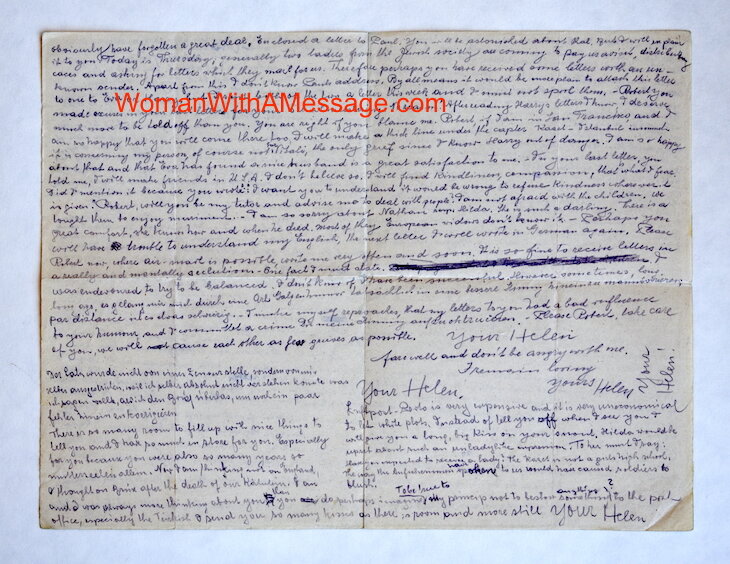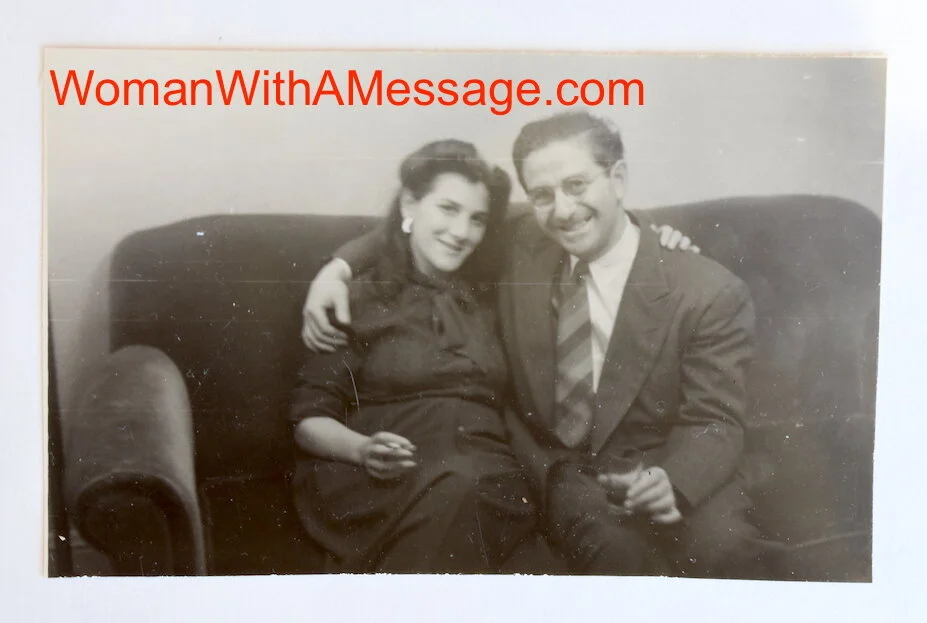That tedious lesson was necessary to understand the trouble of a mother of a three-year-old, taking her out for a trip.
I told my girl: “Eva, it is your birthday and I will take you out without your little brother.”
-“That is fine.”
-“Will you not take along your new doll?”
-“I don’t want to carry it along all day.”
-“No maternal instinct at all,” I thought.
-“Where shall we go, Eva? Prater or Rudolfshof?”
-“Rudolshof, and I want to have an ice-bombe.” (different flavors of ice cream in various colors, imbedded in two shells of meringue, big enough to serve four people)
-“All right,” I said and thought she will not be always three years old. Today I will let her have her will and I will say to the waitress to fill it with only half the amount.
We took the streetcar #38 and my daughter behaved herself and accepted the seat I had chosen, unlike her general habit. She looked very pretty in her new dress of white muslin with blue dots.
At the Waisenhausgasse Orphanage stop, two capuchin monks entered the car and seated themselves opposite of us.
-“Mutti, why have the two men no hats and go on the street in their housecoats?
-“They don’t wear housecoats” I whispered, “and don’t talk so loud.”
-“Why?”
-“It is not customary. Imagine if everybody would talk as loud as you do at the same time, what a noise there would be in the streetcar.”
-“But nobody besides me talks.”
-“Because all people here in the tram have better manners,” I lisped into her ear. “Nobody is interested in your conversation. Therefore, if you have to tell me something or want to ask me a question, do it in a way that not all the people have to listen to it.”
-“The two men wear clotheslines instead of belts. Why are they dressed so funny?”
-“They are monks and the garb they wear is required by the order they belong to,” I whispered and repeated: “Please lower your voice.”
I tried to divert her attention to something on the street but my daughter didn’t care about what was going on outside.
-“What are monks?”
-“Priests. And now be silent for a little while, please. Take into consideration that not all people like to have their thoughts disturbed.”
-“What kind of priests?”
-“Kapuziner (Capuchins).”
Immediately my daughter started to sing a hit, just in vogue at that time: “O, Katherina, o, Katherina schenk mir ein ‘nen Kapuziner.” (O, Catherine, o, Catherine, Serve me a little cup of dark, brown coffee), but the way my child pronounced it when she picked up that song on the street ran: “O, Catherine, o, Catherine, present me with a little monk.”
I dropped my handbag, lost my color and my wits, and my only wish was to leave the car.
-“Come along Eva, we have to get out.”
-“No, it is not yet the terminal and Rudolfshof is the next to last station.”
-“You are right, but I remembered that I have an errand here in the neighborhood and then we will take the next car.”
-“Today is my birthday and I want you not to run errands.”
Disregarding her objection, I pulled the cord and approached the exit, but my daughter showed not the slightest inclination to leave the tram. The car stopped at the next corner but my child didn’t want to leave the car and I had to postpone my “errand.” Eva ran back to where the monks were sitting, placing her little person before them. The older one was a very stout man; the younger one was tall and slim. I was afraid that my daughter would make some remarks to continue the conversation. I took her hand and wanted to tie her to a bench in the most remote corner, but Eva grasped with her other little paw the garment of one of the monks, without finding it worthwhile to contradict my: “Come and sit down, please.”
-“What is your name, please?” she asked the older priest, bending her head a little to one side and casting him a coquettish glance, which had she been fifteen years older would have been called “irresistible.”
-The friendly priest said, smiling: “Father Anselmo.”
-“And yours?” she asked with a similar look to the younger priest.
-“Frater Clemens.”
-“My name is Eva Maria Nehoc and my mother’s name is Helene and my father’s is Vitali.”
All passengers, except me, seemed very amused and I thought: “five minutes more and all the people in the car would be informed in which income tax bracket we belong.”
-“Why did my mutti tell me your names were Kapuziner?”
-“That is the name of our brotherhood.”
-“The name of our brotherhood is Harry.”
-“I think you love your brother very much,” said the young priest.
-“Not too much. He is screaming a lot and so loud.”
-“How old is he?”
-“Three months.”
-“You did the same when you were a baby, only you can’t remember.”
-“Maybe, but I had no brother nor sister who would be annoyed by my hollering.”
-“But you have parents, who perhaps didn’t like it either.”
-“Oh, they didn’t mind,” she said deprecatingly.
For a few minutes I didn’t listen to what my daughter told them, but it must have been something very funny because all our fellow-passengers roared with laughter. Even the two monks were smiling.
My daughter still stood before them supporting herself on their knees as the car took a sharp curve. I rose from my seat and asked my little girl to be good and sit down.
-“Mutti, you have to give Father Anselmo and Frater Clemens some money to buy themselves socks, they don’t have any.”
-I tore her away vigorously and said: “I will, but not on the streetcar.”
-“Why?”
-“In churches are boxes to put money in.”
-“But you never go to churches. Will you go to their homes?”
-“I will go to a church today and you can accompany me.”
-“Poor men. They have to wash their feet very often, don’t they?”
-I bent to her ear and whispered: “They do, but please be quiet, really my head aches from your talking continually.”
-“If you have a headache, I am sure you will not go to church today. Shall I ask for their address so you can pay them a visit to their home?”
I was at the end of my wits and did not answer her anymore, but Heaven heard my prayer. The two monks had to leave at the next stop. An elderly lady saw that the two priests had risen to leave the car, stood up too to kiss their hands. My daughter watched it, ran to the exit and called: “Father Anselmo, Frater Clemens, please wait a moment, my mutti wants to kiss your hands too.”
That time they didn’t pay attention to the wish of my daughter.
The car moved in the same direction the two Kapuziner monks walked, and when we passed them Eva waved with her little hand and they answered her salutation with a smile.











































